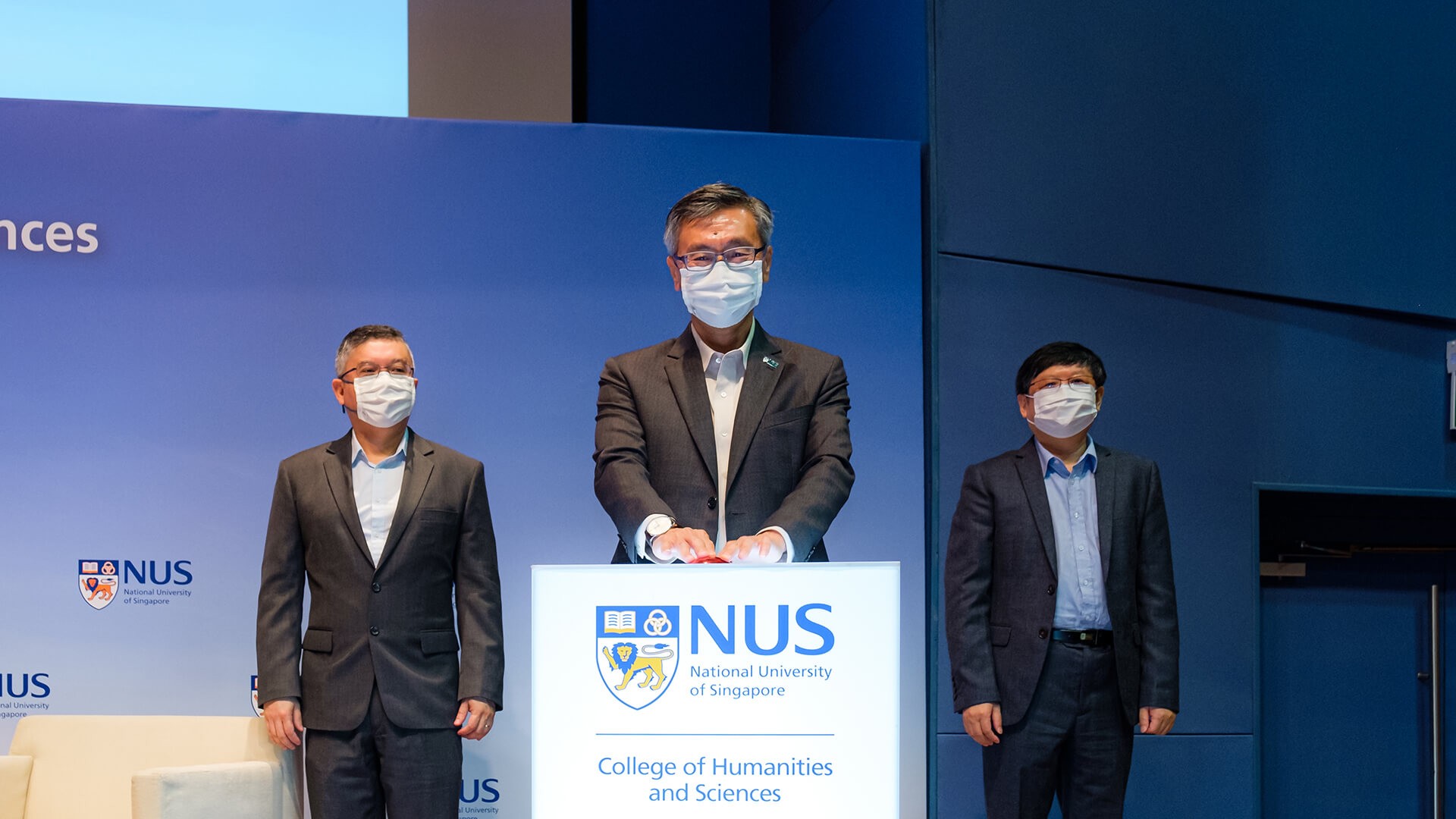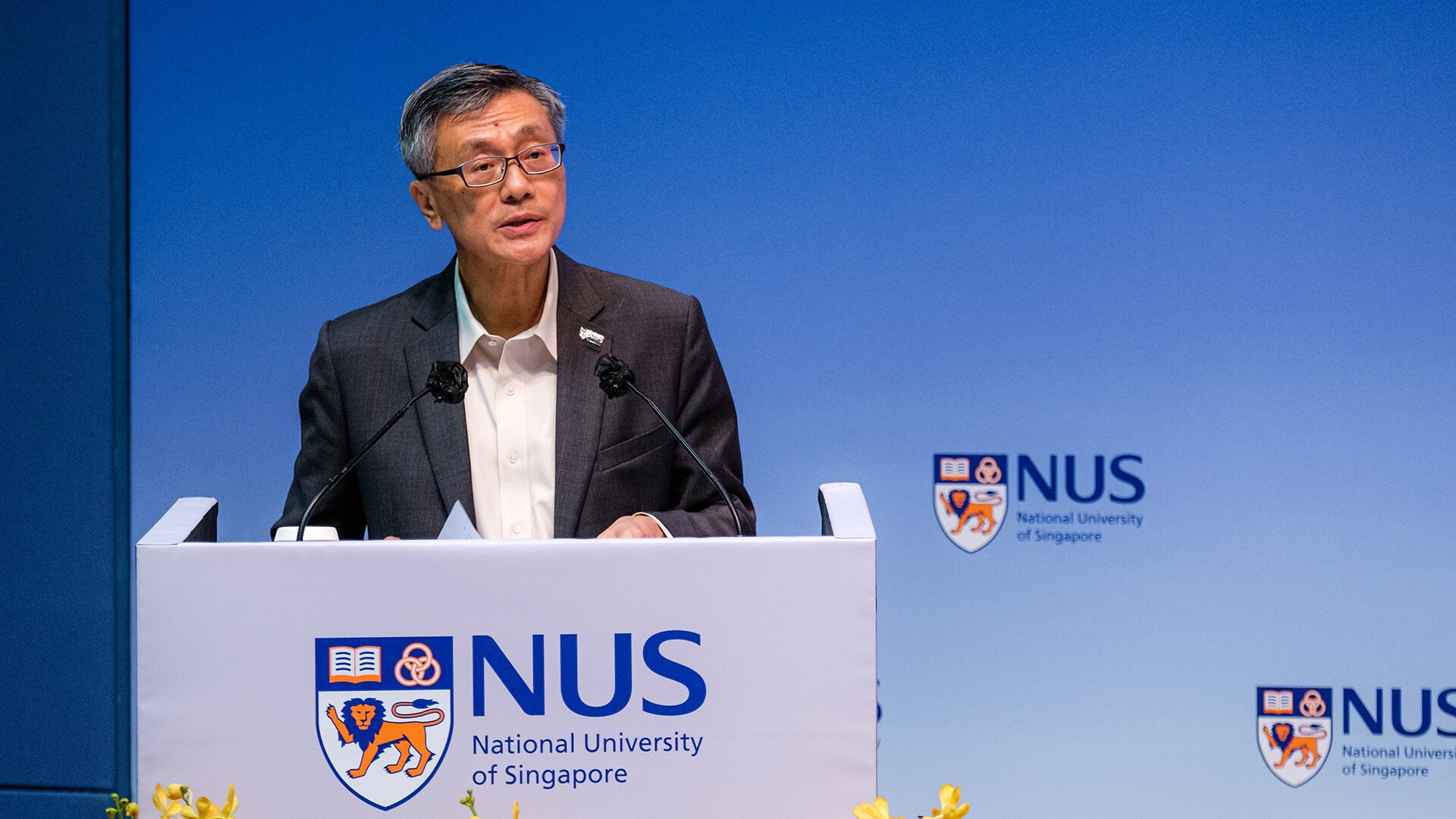NUS launches College of Humanities and Sciences to scale up interdisciplinary education
With the launch of the new College of Humanities and Sciences (CHS), NUS will bring together the deep expertise of the Faculty of Arts & Social Sciences (FASS) and the Faculty of Science (FOS) to deliver an interdisciplinary education to students.
The College will admit its inaugural cohort in Academic Year 2021/2022 and will take in more than 2,000 undergraduates every year.
Instead of entering FASS or FOS directly – as is the case presently – the incoming cohort will be admitted first to CHS. They will study a carefully curated Common Curriculum before going on to select any major offered by FASS or FOS. At the end of the four-year Honours course, the students will graduate with the Bachelor of Arts, Bachelor of Social Sciences or Bachelor of Science degree.
“Through this College, we aim to prepare students for a future of change and complexity,” said NUS President Professor Tan Eng Chye.
He noted that jobs have been destabilised in an uncertain, complex and volatile environment. Additionally, the speed and intensity of technological change is increasing. These trends have been reinforced by COVID-19.
“The graduates of the future must be well prepared to navigate this new terrain and solve complex problems from multiple fronts. They need to not just work alongside one another, but with each other,” said Prof Tan.
This highlights the importance of an interdisciplinary education. “The more you integrate knowledge across disciplines and understand various perspectives, the more effective a problem solver you are.”
In fact, interdisciplinary studies have been in the University’s DNA over the last 20 years. Some examples include the Special Programme in Science, University Town College Programme, University Scholars Programme and Yale-NUS College.
The big difference is in terms of scale. FASS takes in about 1,400 first-year students annually, while FOS admits about 1,000. The CHS will offer an interdisciplinary education to all incoming freshmen who want to pursue a degree course offered by FASS or FOS – which are among the largest faculties at the University.
There will be more to come, with plans afoot to offer interdisciplinary education to those from different faculties.
“I am also pleased to share that the CHS is not a standalone effort but the first in a pipeline of new initiatives by the University to offer more interdisciplinary experiences. Beyond FASS and FOS, students from other faculties and schools will soon be able to reap the benefits of interdisciplinary studies in the time ahead,” said Prof Tan.
He said that more information on these new initiatives will be shared in due course.
A foundation of interdisciplinarity
Undergraduates will kick off their CHS journey by taking a Common Curriculum that comprises 13 modules, or one-third of the total curriculum. The Common Curriculum imparts essential foundational skills and broadens the students’ intellectual foundations. It comprises:
- Five new integrated modules. These cover Asian Studies; Integrated Social Sciences; Integrated Humanities and two modules in Scientific Inquiry. Asian Studies will equip students with appreciation for cultural diversity, while Integrated Social Sciences and Integrated Humanities will help students to develop capabilities in areas such as critical thinking. The two Scientific Inquiry modules will teach students how to use a science-based lens to critically review and evaluate phenomena.
- Six General Education modules. These will build strong foundations in reading, writing, critical thinking and numeracy. Three new General Education modules in Design Thinking, Artificial Intelligence, and Community and Engagement will equip students with the skills needed to thrive in a digital and interconnected world.
- Two new interdisciplinary modules. These modules, drawn from a basket of offerings, will further train students on the ability to connect insights across multiple disciplines.
This new way of instruction and learning will be delivered through problem-based pedagogies, emphasising the interface between disciplines.
Students will have a lot of choice and flexibility as they chart the rest of their CHS education along several student-centric pathways. They can be versatilists with one major and unrestricted electives; integrators with two majors and unrestricted electives; or deep specialists with one major. FASS and FOS will offer more than 1,000 modules per year for students to choose from.
The CHS education will be reinforced through expanded experiential learning opportunities in internships, fieldwork, and capstone projects to help students gain more real-world experience.
“With the breadth of choice available, students can decide if they want a more broad-based or specialised experience. Whether the intention is to work in the private sector or pursue a doctorate, CHS will provide the foundations, exposure and rigour to support myriad pathways and ambitions,” said Professor Robbie Goh, CHS Co-Dean and Dean of FASS.
Thumbs-up from employers
With their training, CHS graduates will be well-equipped for complex roles across diverse industries. These roles include data scientists, digital marketing strategists, environmental consultants, food technologists, health policy analysts, and more.
Professor Sun Yeneng, CHS Co-Dean and Dean of FOS, said that CHS aims to combine academic passions with disciplines sought after by employers.
Indeed, employers strongly support the new College and its interdisciplinary approach.
“To deal with rapid change and increasing complex global challenges, employers value people with good breadth and depth of knowledge, and the ability to lead and work in multidisciplinary teams. In today’s world of continuous disruptions, employees must embrace lifelong learning to remain relevant. At DSTA, we have therefore placed strong emphasis on developing our people with broad-based perspectives, to consistently deliver innovative solutions for Singapore’s defence,” said Mr Tan Peng Yam, Chief Executive of the Defence Science and Technology Agency (DSTA).
It is “heartening” that NUS is taking the positive step to launch CHS, he noted. “It will offer a good headstart for aspiring minds to build a strong multidisciplinary foundation to address present and future technological challenge,” he added.
Discussing the future of work
The launch event included a discussion on the future of work with panellists Ms Lai Wei Lin, Permanent Secretary at the Ministry of Law and Second Permanent Secretary at the Ministry of Education; and Mr Ye Gang, Co-Founder and Group Chief Operating Officer of Sea Group. The session was moderated by Prof Tan.
As a rapidly-growing employer, Sea Group takes on about 150 to 200 new hires every month. “Of course, for certain roles such as computer science and programming, we care a lot about their knowledge in programming and coding. But for a big chunk of the hires, we focus less on the knowledge but more on their characters, the softer part of the candidates,” Mr Ye said.
“Is he innovative enough, creative enough? Is he open minded? Can he adapt well? Is he an interesting person? Those qualities are things that we look at more in a candidate.”
Mr Ye said that the quick development of technology means that a lot of jobs will be eventually replaced by automation. As a result, employees will need to focus more on the “creative side of things that make humans unique”.
Singapore’s education system is adapting to educate students so they can thrive in the new economy.
“We have constantly grappled with what to teach, when to teach it, and how to teach it. Those are some of the very critical questions in education,” said Ms Lai.
She shared that the country has been bringing broad exposure to students even from a young age. They take diverse subjects including languages, mathematics, science, social studies, humanities, art, music and physical education. For several years, A-Level students have had to take a contrasting subject – for instance, science students must take a humanities or social science subject.
The multidisciplinary exposure continues into higher education, Ms Lai said. The education system is also allowing students to obtain more working experience via programmes such as internships, and encouraging more self-directed learning.
Prof Tan noted that these strategies contribute to the strengths of the country’s education system. Singapore is always looking out for ways to refine its educational approach, he added.
See press release and recording of the launch event for CHS.






